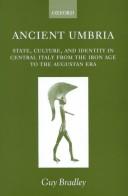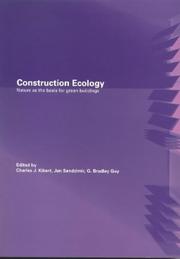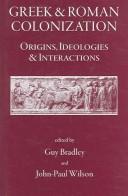| Listing 1 - 10 of 12 | << page >> |
Sort by
|

ISBN: 0199245142 9780199245147 Year: 2000 Publisher: Oxford Oxford university press
Abstract | Keywords | Export | Availability | Bookmark
 Loading...
Loading...Choose an application
- Reference Manager
- EndNote
- RefWorks (Direct export to RefWorks)
Umbria (Italy) --- Rome --- History --- Relations --- Ombrie (Italie) --- Romans --- Romains --- History. --- Civilization --- Roman influences --- Histoire --- Civilisation --- Influence romaine --- Roman influences. --- Umbria (Italy) - History --- Umbria (Italy) - Relations - Rome --- Rome - Relations - Italy - Umbria
Book
ISBN: 9780748621101 0748621105 9780748629343 0748629343 0748621091 9780748621095 9781474480680 1474480683 Year: 2020 Publisher: Edinburgh
Abstract | Keywords | Export | Availability | Bookmark
 Loading...
Loading...Choose an application
- Reference Manager
- EndNote
- RefWorks (Direct export to RefWorks)
A new view of early Rome as a highly mobile society within a wider interconnected Mediterranean networkCovers the rise of Rome from small scale community to supremacy in central ItalyUses the latest archaeological evidence to demonstrate the sophisticated and cosmopolitan nature of early RomeAnalyses the origins of Rome's Republican form of government and of its aggressive drive to conquerIn the first few centuries of its existence, Rome developed from a minor settlement on the Tiber into the most powerful city-state in Italy.Guy Bradley examines the reasons for Rome's emergence and success within a highly competitive Italian environment, and how much it owed to its neighbours. He explains how many of Rome's key characteristics, such as its powerful ruling elite, its stable political institutions, its openness to outsiders, and its intensely militaristic society, were shaped by their origins in the monarchy and early Republic.
Rome --- History --- Civilization. --- Rome-History-To 510 B.C. --- HISTORY / Ancient / Rome.

ISBN: 1280446609 019155409X 1423785681 9781423785682 9780199245147 0199245142 9781280446603 0198153015 9780198153016 9786610446605 6610446601 1383038163 Year: 2000 Publisher: Oxford New York Oxford University Press
Abstract | Keywords | Export | Availability | Bookmark
 Loading...
Loading...Choose an application
- Reference Manager
- EndNote
- RefWorks (Direct export to RefWorks)
This study examines the history of Umbria in the first millenium B.C., examining the reasons behind the successful Roman conquest of this area and the impact of Roman domination on the plurality of cultures, religions and identities in the region.
Umbria (Italy) --- Regione dell'Umbria (Italy) --- Regione Umbra (Italy) --- Regione Umbria (Italy) --- History. --- Antiquities. --- Relations --- Rome
Book
ISBN: 9781614515203 1614515204 Year: 2018 Publisher: Boston ; Berlin : De Gruyter,
Abstract | Keywords | Export | Availability | Bookmark
 Loading...
Loading...Choose an application
- Reference Manager
- EndNote
- RefWorks (Direct export to RefWorks)
Although there are many studies of certain individual ancient Italic groups (e.g. the Etruscans, Gauls and Latins), there is no work that takes a comprehensive view of each of them?the famous and the less well-known?that existed in Iron Age and Roman Italy. Moreover, many previous studies have focused only on the material evidence for these groups or on what the literary sources have to say about them. This handbook is conceived of as a resource for archaeologists, historians, philologists and other scholars interested in finding out more about Italic groups from the earliest period they are detectable (early Iron Age, in most instances), down to the time when they begin to assimilate into the Roman state (in the late Republican or early Imperial period). As such, it will endeavor to include both archaeological and historical perspectives on each group, with contributions from the best-known or up-and-coming archaeologists and historians for these peoples and topics. The language of the volume is English, but scholars from around the world have contributed to it. This volume covers the ancient peoples of Italy more comprehensively in individual chapters, and it is also distinct because it has a thematic section.
Peuples italiques --- Italie --- Antiquités. --- Italic peoples. --- Ethnology --- History --- Rome --- Italy --- Social conditions --- Civilization --- Antiquities. --- Peuples italiques. --- Antiquités --- Ethnology - Rome - History --- Ethnology - Italy - History --- Rome - Social conditions --- Italy - Social conditions
Book
ISBN: 1614513007 1614515204 1501500147 Year: 2018 Publisher: Berlin, [Germany] ; Boston, [Massachusetts] : De Gruyter,
Abstract | Keywords | Export | Availability | Bookmark
 Loading...
Loading...Choose an application
- Reference Manager
- EndNote
- RefWorks (Direct export to RefWorks)
Although there are many studies of certain individual ancient Italic groups (e.g. the Etruscans, Gauls and Latins), there is no work that takes a comprehensive view of each of them-the famous and the less well-known-that existed in Iron Age and Roman Italy. Moreover, many previous studies have focused only on the material evidence for these groups or on what the literary sources have to say about them. This handbook is conceived of as a resource for archaeologists, historians, philologists and other scholars interested in finding out more about Italic groups from the earliest period they are detectable (early Iron Age, in most instances), down to the time when they begin to assimilate into the Roman state (in the late Republican or early Imperial period). As such, it will endeavor to include both archaeological and historical perspectives on each group, with contributions from the best-known or up-and-coming archaeologists and historians for these peoples and topics. The language of the volume is English, but scholars from around the world have contributed to it. This volume covers the ancient peoples of Italy more comprehensively in individual chapters, and it is also distinct because it has a thematic section.
Alte Geschichte. --- Ancient history. --- Kultur. --- Völker. --- culture. --- tribes. --- Italy --- Civilization --- Italic peoples. --- Völker. --- HISTORY / Ancient / General. --- Tribes and tribal system --- Families --- Clans --- Cultural sociology --- Culture --- Sociology of culture --- Popular culture --- Ethnology --- Etruscans --- Ancient history --- Ancient world history --- World history --- Social aspects

ISBN: 0415260922 9780415260923 9786610048410 1280048417 0203166140 9780203166147 9781134508266 9781134508303 9781134508310 9781138134362 1134508301 Year: 2002 Publisher: London Spon Press
Abstract | Keywords | Export | Availability | Bookmark
 Loading...
Loading...Choose an application
- Reference Manager
- EndNote
- RefWorks (Direct export to RefWorks)
Biology --- environments [object groupings] --- sustainable architecture --- Architecture --- Nature --- Environmental protection. Environmental technology --- Architecture and society. --- Building materials --- Building. --- Construction industry --- Sustainable buildings --- Environmental aspects. --- Appropriate technology. --- Design and construction. --- Building materials. Building technology --- 69.03 --- 69.03 Size, permanence, location and shape of buildings --- Size, permanence, location and shape of buildings

ISBN: 1905125062 9781905125067 Year: 2006 Publisher: Swansea: Classical press of Wales,
Abstract | Keywords | Export | Availability | Bookmark
 Loading...
Loading...Choose an application
- Reference Manager
- EndNote
- RefWorks (Direct export to RefWorks)
Colonization --- History --- Rome --- Greece --- Colonies --- Kolonisatie. --- Griekse oudheid. --- Romeinse oudheid. --- Kolonie. --- Colonies. --- Colonization. --- History. --- Middellandse-Zeegebied. --- Römisches Reich. --- Griechenland (Altertum) --- Greece. --- Rome (Empire). --- Griechenland (Altertum). --- Colonization - History --- Rome - Colonies --- Greece - Colonies
Book
ISBN: 9780859898133 085989813X Year: 2007 Publisher: Exeter : University of Exeter press,
Abstract | Keywords | Export | Availability | Bookmark
 Loading...
Loading...Choose an application
- Reference Manager
- EndNote
- RefWorks (Direct export to RefWorks)
Architecture --- Excavations (Archaeology) --- Italy --- Civilization --- History --- Antiquities --- Italiotes --- Italiker. --- Kelten. --- Etrusker. --- Italiker --- Romanisierung. --- Italien. --- Italic peoples --- Congresses --- Histoire --- Congrès --- Italie --- Congresses. --- Architecture - Italy --- Excavations (Archaeology) - Italy --- Italy - Civilization --- Italy - History --- Italy - Antiquities
Book
ISBN: 1910589012 9781910589014 Year: 2015 Publisher: Swansea: Classical press of Wales,
Abstract | Keywords | Export | Availability | Bookmark
 Loading...
Loading...Choose an application
- Reference Manager
- EndNote
- RefWorks (Direct export to RefWorks)
Altertum. --- Aristocracy (Social class) --- Aristocracy (Social class). --- Aristokratie. --- Civilization, Classical. --- Civilization, Classical. --- Elite (Social sciences) --- Elite (Social sciences). --- Elites. --- Griekse oudheid. --- Romeinse oudheid. --- History. --- History. --- Grèce antique. --- Rome.
Digital
ISBN: 9781280446603 Year: 2000 Publisher: Oxford New York Oxford University Press
Abstract | Keywords | Export | Availability | Bookmark
 Loading...
Loading...Choose an application
- Reference Manager
- EndNote
- RefWorks (Direct export to RefWorks)
| Listing 1 - 10 of 12 | << page >> |
Sort by
|

 Search
Search Feedback
Feedback About UniCat
About UniCat  Help
Help News
News